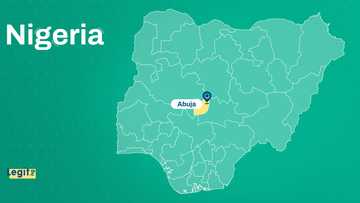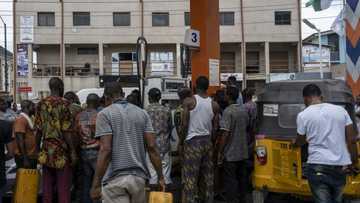Interest Rate: CBN Sets for Important Meeting as Naira Woes, Fuel Price Raises concerns
- Hopes that the Central Bank of Nigeria would advocate for a pause to interest rate increases were shattered
- This is as a result of a 45 percent hike in gas prices at the pump and further pressure on the naira
- This coincides with a major fuel scarcity that has caused lengthy lineups at gas stations across the country
Don't miss out! Join Legit.ng's Sports News channel on WhatsApp now!
Legit.ng journalist Zainab Iwayemi has over 3-year-experience covering the Economy, Technology, and Capital Market.
Expectations that the Central Bank of Nigeria would push for a halt on an interest-rate hike at a meeting this month were dashed by a 45% increase in the price of petrol at the pump and ongoing pressure on the naira.

Source: Getty Images
The nation's capital, Abuja, has three separate retail outlets run by the state-owned NNPC that have pricing display boards showing that the company increased gasoline to N897 ($0.56) a litre on Tuesday.
This comes at a time when there is a severe shortage of fuel, which has led to long lines at gas stations and slowed down economic growth in the country of West Africa.
PAY ATTENTION: Click “See First” under the “Following” tab to see Legit.ng News on your Facebook News Feed!
The NNPC indicated that supply is being squeezed by its debt to oil merchants, which it disputes and which media sources place at roughly $6 billion. According to NNPC, the government owes it $4.9 billion, or 7.8 trillion naira.
In Lagos, the country's commercial centre, transporters have doubled fees in response to the rise in fuel prices, sparking concerns about fresh pressure on inflation. July saw a slowdown in annual consumer price increase for the first time in two years, falling to 33.2% from 34.2% in June—a almost three-decade high.
CBN continues to increase rate
Since 2022, the central bank has increased its benchmark interest rate by 15.25 percentage points, reaching a record 26.75% in July. The monetary policy committee of the bank located in Abuja will convene next on September 23 and 24.
“We think that a broader shift toward monetary easing may be premature this year despite inflation trending lower,” Ayodeji Dawodu, an analyst at BancTrust Investment Bank Ltd., said by email. Cutting the rate “could deter much-needed foreign currency inflows and induce pressure on the exchange rate,” he said.
Concerns about inflation have increased due to pressure on the naira, which fell to a nearly five-month low of 1,625.88 per dollar on Wednesday.
With the exception of the Lebanese pound and Ethiopia's birr, the currency has lost 43% of its value against the US dollar so far this year, making it the worst performer globally.
The governor of the central bank, Olayemi Cardoso, has highlighted in many meetings that policymakers are dedicated to containing inflation. However, in July, she hinted that if price pressures abated, the key rate would decrease soon.
New petrol prices are pointers to the high possibility of a rise in inflation figures because of transport and commodities costs, Segun Ajayi-Kadir, director-general of the Manufacturers Association of Nigeria told Bloomberg.
He added,
“Consumers will spend more on transportation and energy, leaving them with less disposable income.”
Reacting to this, Charles Abuede, a financial analyst said,
"The onus lies on the monetary and fiscal authorities to put in place friendly policies to aid the management of the fx market."
Analysts predict new naira rate against dollar
Legit.ng reported that analysts believe that the naira will stabilise around N1,500 in the second half of the year, after the Central Bank of Nigeria's (CBN) recent injection of foreign exchange sales to Bureaux De Change (BDCs).
ThisDay reported that this forecast can be found in the United Capital Half-Year Economic Outlook, which is headlined "Balancing Act: Nigeria's Path to Economic Stability."
According to the report, even if the CBN keeps interfering in the foreign exchange market, the naira will weaken for the remainder of the year as a result of speculation, stockpiling, and a lack of confidence.
PAY ATTENTION: Сheck out news that is picked exactly for YOU ➡️ find the “Recommended for you” block on the home page and enjoy!
Source: Legit.ng





